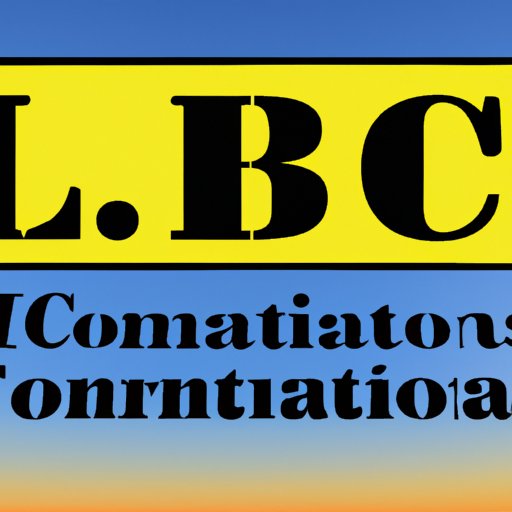Introduction
Starting a business can be an exciting but daunting process. Aspiring entrepreneurs must consider a range of factors such as business structure and state regulations. In California, forming a Limited Liability Company (LLC) is one of the most popular business structures due to its many advantages. This article will provide an overview of what an LLC is, the benefits of forming an LLC in California, the steps to register an LLC, as well as the legal and tax implications of owning an LLC in California.
Overview of LLCs in California
A Limited Liability Company (LLC) is a type of business entity that is legally separate from its owners. It provides limited liability protection for its owners, meaning their personal assets are protected from the liabilities and debts of the business. Additionally, an LLC is not taxed at the business level. Instead, the profits and losses of the business are “passed through” to the owners and are reported on their individual income tax returns.


Benefits of Forming an LLC in California
Forming an LLC in California offers several advantages, including limited liability, tax advantages, asset protection, and management flexibility. According to the Small Business Administration, LLCs are “easier and less expensive to set up and maintain than more traditional corporations.”
Limited Liability
The primary benefit of forming an LLC in California is limited liability protection. This means that the business’s creditors cannot come after the owner’s personal assets if the business fails or is sued. The exception is if the owner has personally guaranteed any of the business’s debts.
Tax Advantages
The second major benefit of forming an LLC in California is the potential tax savings. Unlike a corporation, an LLC is not taxed at the business level. Instead, the profits and losses are “passed through” to the owners and are reported on their individual income tax returns. This allows the owners to take advantage of certain tax deductions that may not be available to corporations.
Asset Protection
An LLC also provides asset protection for its owners. If the LLC is sued, the creditors cannot go after the owner’s personal assets, as the LLC is a separate legal entity. This makes the LLC a great option for those who want to protect their personal assets from the risks associated with running a business.
Management Flexibility
Finally, an LLC offers management flexibility. Owners can choose how they want to manage the business, whether it is by themselves, with other members, or with outside professionals. Additionally, owners can decide how much control each member has over the business, allowing them to customize the structure of the LLC to suit their needs.
Outline Steps to Start an LLC in California
Once you have decided to form an LLC in California, there are several steps you must take in order to complete the process. These include: determining your business requirements; filing the required documents; and following the filing process.
Business Requirements
The first step in forming an LLC in California is to determine your business requirements. You must decide on the name of the LLC, the purpose of the LLC, the location of the LLC, the type of management structure, and the number of members. All of these requirements must be included in the Articles of Organization, which is the document filed with the California Secretary of State.
Required Documents
The next step is to file the required documents. To do this, you must submit the Articles of Organization to the California Secretary of State. Additionally, you may need to file other documents, such as an Operating Agreement, depending on the type of LLC you are forming.
Filing Process
Once you have filed the required documents, you must follow the filing process. This includes paying the filing fee, submitting the documents to the Secretary of State, and waiting for the approval of the LLC. Once the LLC is approved, you will receive a Certificate of Formation and the LLC will officially be established.


Benefits of Forming an LLC in California
In addition to providing limited liability protection, tax advantages, and asset protection, forming an LLC in California offers several other benefits. According to the National Law Review, an LLC provides “greater flexibility in terms of management structure, capital contributions, and distribution of profits and losses.” Additionally, LLCs offer more privacy than other business structures, as the names of the owners are not publicly disclosed.

Resources to Help Start an LLC in California
There are several resources available to help you start an LLC in California. One of the most popular options is to use an online service, such as LegalZoom or IncFile. These services provide step-by-step guidance to help you complete the paperwork and filing process. Additionally, you can hire a professional consultant to help you with the process. Professional consultants can provide advice on the best way to structure your LLC and can handle the paperwork and filing process on your behalf.

Tax Implications of Forming an LLC in California
When forming an LLC in California, it’s important to understand the tax implications. LLCs are subject to both state and federal taxes. Additionally, LLCs can take advantage of certain tax deductions, such as business expenses, charitable contributions, and home office deductions.
Legal Obligations of Owning an LLC in California
Owners of an LLC in California must adhere to certain legal obligations. These include having an Operating Agreement, filing annual reports, and keeping records of all business transactions. Additionally, owners must comply with all applicable state and federal laws, such as labor laws, environmental laws, and tax laws.
Conclusion
Forming an LLC in California offers many benefits, including limited liability, tax advantages, asset protection, and management flexibility. Additionally, there are several resources available to help aspiring entrepreneurs start an LLC in California. However, it’s important to understand the legal and tax implications of owning an LLC in California, as well as the legal obligations owners must adhere to. Overall, forming an LLC in California can be a great way to protect your personal assets and maximize your business potential.
(Note: Is this article not meeting your expectations? Do you have knowledge or insights to share? Unlock new opportunities and expand your reach by joining our authors team. Click Registration to join us and share your expertise with our readers.)
